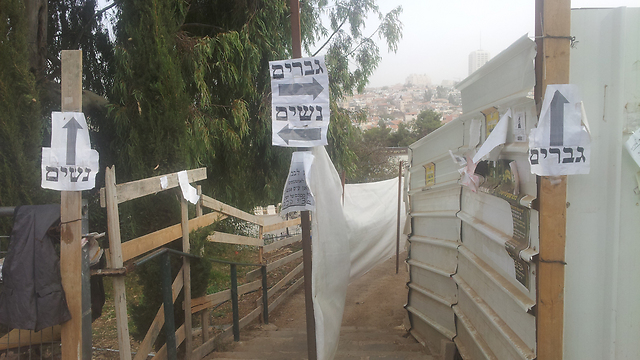The Jerusalem District Court has ruled that unless deceased’s family specifically requests segregation, Chevra Kadisha burial society can no longer place signs separating between men & women at cemeteries.
By Kobi Nachshoni
The Chevra Kadisha burial society will not be able to place signs separating between men and women in cemeteries, unless the deceased’s family specifically asks for it, the Jerusalem District Court has ruled.

Sign reads, ‘Men to the right, women to the left’ (archives)
The outline suggested by the court has been accepted by both Chevra Kadisha and groups opposing gender segregation. The parties are now waiting for Attorney General Yehuda Weinstein to confirm that the proposal does not fall under the category of forbidden exclusion of women in the public domain.
The court intervened in the matter following a claim submitted by the Israel Religious Action Center (IRAC) and the Human Rights Clinic at Tel Aviv University’s Faculty of Law against Chevra Kadisha in Jerusalem and Rehovot for ignoring the Religious Services Ministry’s ban on gender segregation in cemeteries.
In a preliminary discussion held by Judge Yigal Mersel, the plaintiffs’ representatives, attorneys Orly Erez-Lachovsky and Adi Nir-Binyamini, claimed that Chevra Kadisha responded to the memo issued by the Religious Services Ministry’s director-general in 2013 by changing the wording on the segregation signs or using other legal tricks in order to continue the separation between men and women.
Chevra Kadisha’s representative said in response that the burial society was acting in accordance with rabbis’ instructions and under Jewish Law.
‘The end of discriminating signs in cemeteries’
The court suggested that the sides reach a compromise, under which the cemeteries will get electronic signposts which will indicate a separation between men and women only according to a specific request made by the deceased’s family, and only during the funeral. This will also be made clear in the funeral order form.
Last week, both parties informed the court of their consent to adopt the outline. The proposal has been handed over to the attorney general, and after its approval Judge Mersel is expected to declare it formal ruling.
“This is excellent news,” said Attorney Erez-Lachovsky, who runs the IRAC’s legal department. “The two Chevra Kadisha companies involved in this affair firmly refused to obey the Religious Service Ministry director-general’s memo which ordered them to remove the signs. This marks the end of discriminating segregation signs in cemeteries.”
View original Ynet publication at: http://www.ynetnews.com/articles/0,7340,L-4601450,00.html






 Israeli New Shekel Exchange Rate
Israeli New Shekel Exchange Rate